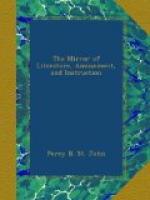“I am now in the fifth act of ‘Foscari,’
being the third tragedy in twelve months, besides
proses; so you perceive that I am not at all
idle. And are you, too, busy? I doubt that
your life at Paris draws too much upon your time,
which is a pity. Can’t you divide your day,
so as to combine both? I have had plenty of all
sorts of worldly business on my hands last year—and
yet it is not so difficult to give a few hours to the
Muses. This sentence is so like ——
that—
“Ever, &c.”
FROM “DETACHED THOUGHTS.”
“What a strange thing is life and man! Were I to present myself at the door of the house where my daughter now is, the door would be shut in my face—unless (as is not impossible) I knocked down the porter; and if I had gone in that year (and perhaps now) to Drontheim (the furthest town in Norway), or into Holstein, I should have been received with open arms into the mansion of strangers and foreigners, attached to me by no tie but by that of mind and rumour.
“As far as fame goes, I have had my share: it has indeed been leavened by other human contingencies, and this in a greater degree than has occurred to most literary men of a decent rank of life; but, on the whole, I take it that such equipoise is the condition of humanity.”
“A young American, named Coolidge, called on me not many months ago. He was intelligent, very handsome, and not more than twenty years old, according to appearances; a little romantic, but that sits well upon youth, and mighty fond of poesy, as may be suspected from his approaching me in my cavern. He brought me a message from an old servant of my family (Joe Murray), and told me that he (Mr. Coolidge) had obtained a copy of my bust from Thorwaldsen, at Rome, to send to America. I confess I was more flattered by this young enthusiasm of a solitary Trans-Atlantic traveller, than if they had decreed me a statue in the Paris Pantheon (I have seen emperors and demagogues cast down from their pedestals even in my own time, and Grattan’s name razed from the street called after him in Dublin); I say that I was more flattered by it, because it was single, unpolitical, and was without motive or ostentation—the pure and warm feeling of a boy for the poet he admired. It must have been expensive, though;—I would not pay the price of a Thorwaldsen bust for any human head and shoulders, except Napoleon’s, or my children’s, or some ‘absurd womankind’s,’ as Monkbarn’s calls them—or my sister’s. If asked why, then, I sate for my own?—Answer, that it was at the particular request of J.C. Hobhouse, Esq., and for no one else. A picture is a different matter;—every body sits for their picture;—but a bust looks like putting up pretensions to permanency, and smacks something of a hankering for public fame rather than private remembrance.




